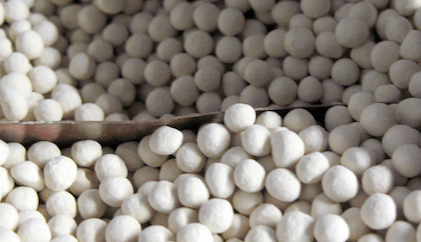Zeolite Stores Thermal Energy For Unlimited Amount of Time
June 07, 2012
on
on

Scientists of the German Fraunhofer Institute have harnessed a natural phenomenon to store heat indefinitely and without energy loss.
Zeolite is a mineral that can store up to four times more heat than water. And what’s better, unlike water which gradually cools off, zeolite retains a hundred percent of the heat for an unlimited amount of time.
Zeolite – which means ‘boiling stone’ in Greek- was named for its peculiar properties. Zeolite is extremely porous. So much so, that a gram of the stuff has a surface area of a 1000 square meters (10,764 sq ft). When water comes into contact with zeolite it is bound to its surface by means of a chemical reaction which generates heat. Reversely, when heat is applied the water is removed from the surface, generating large amounts of steam.
The transference of heat to the material does not cause its temperature to rise. Instead, the energy is stored as a potential to adsorb water. The Fraunhofer scientists used these particular properties to turn zeolite into a thermal storage system. They created a storage device and filled it with zeolite pellets. To charge the pellets, they exposed them to heat. To retrieve the energy they simply added water.
The discovery can give a much anticipated boost to thermal storage. Power plants and many industrial processes produce heat as a byproduct. Up to fifty percent of the initial energy input is released as heat.
But heat is difficult to store. The most common form of thermal storage is in huge insulated water tanks. But water can only retain heat for a short period of time which makes it unsuitable for long distance transport. Therefore, in most processes heat is released into the environment unused.
Although the unique properties of zeolite were well known, until now, no one was able to turn it into a working thermal storage system. The German researchers first tested their system with small quantities zeolite to determine whether the material would remain stable over multiple charge and discharge cycles. And it did. Even after thousands of cycles.
Now they’ve built an up-scaled version with a storage volume of 750 liters which they’re testing under realistic conditions.
Via: Igb.fraunhofer.de
Zeolite is a mineral that can store up to four times more heat than water. And what’s better, unlike water which gradually cools off, zeolite retains a hundred percent of the heat for an unlimited amount of time.
Zeolite – which means ‘boiling stone’ in Greek- was named for its peculiar properties. Zeolite is extremely porous. So much so, that a gram of the stuff has a surface area of a 1000 square meters (10,764 sq ft). When water comes into contact with zeolite it is bound to its surface by means of a chemical reaction which generates heat. Reversely, when heat is applied the water is removed from the surface, generating large amounts of steam.
The transference of heat to the material does not cause its temperature to rise. Instead, the energy is stored as a potential to adsorb water. The Fraunhofer scientists used these particular properties to turn zeolite into a thermal storage system. They created a storage device and filled it with zeolite pellets. To charge the pellets, they exposed them to heat. To retrieve the energy they simply added water.
The discovery can give a much anticipated boost to thermal storage. Power plants and many industrial processes produce heat as a byproduct. Up to fifty percent of the initial energy input is released as heat.
But heat is difficult to store. The most common form of thermal storage is in huge insulated water tanks. But water can only retain heat for a short period of time which makes it unsuitable for long distance transport. Therefore, in most processes heat is released into the environment unused.
Although the unique properties of zeolite were well known, until now, no one was able to turn it into a working thermal storage system. The German researchers first tested their system with small quantities zeolite to determine whether the material would remain stable over multiple charge and discharge cycles. And it did. Even after thousands of cycles.
Now they’ve built an up-scaled version with a storage volume of 750 liters which they’re testing under realistic conditions.
Via: Igb.fraunhofer.de
Read full article
Hide full article


Discussion (11 comments)